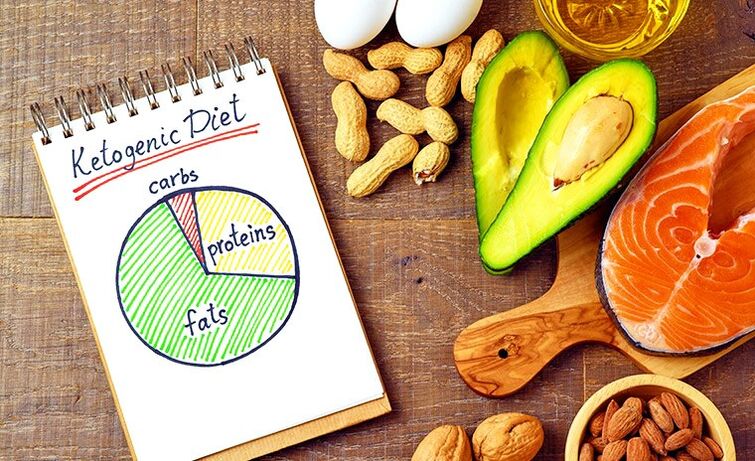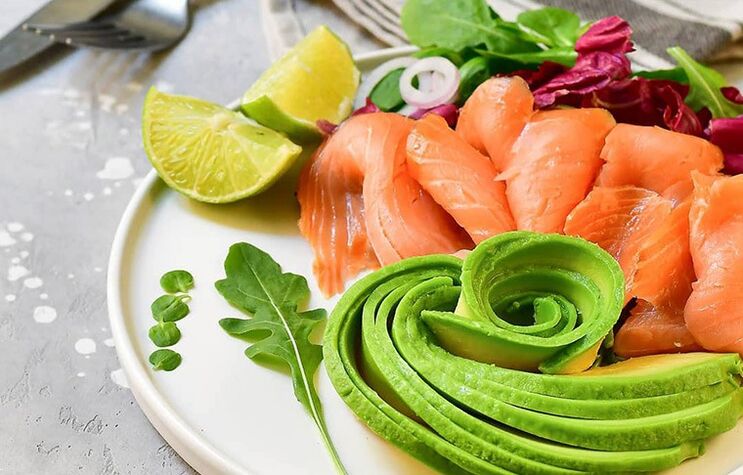
If twenty or thirty years ago, someone put all the products in two baskets and classified them according to the principle of the most useful and least useful, then today you must make a thorough revision to them. The most bizarre story happened during this period of time with Fatty, the nearest main enemy of mankind, not only fully recovered, but almost declared his savior. Is that right, nutritionist Chrismore understands.
Recently, a patient admitted to me that she and her husband ate nearly one kilogram of bacon a week—three slices of bacon for breakfast and two slices of salad for lunch. I have been a nutritionist for more than 20 years, and nothing seems to surprise me, but I still can’t help asking: Why? The patient said that her husband watched a TV show about the ketogenic diet and they decided to give it a try. Six months of bacon-now the husband has lost 9 kilograms, according to his wife, his energy is almost bursting.
More and more I hear from people the miracles that the keto diet can do for them. They claim that it can burn fat in the body, stimulate vitality and fight disease. From now on, you can not only eat bacon as much as possible, but also need it. But all their enthusiasm needs to go through a strict test at least-is the ketogenic diet that does not limit animal fat intake really so good?
The ketogenic diet is a low-carbohydrate diet with high fat content and moderate protein content. It was originally used to treat childhood epilepsy by increasing the level of ketone bodies in the blood.
What is ketosis?
Let's start with the name of the diet: where does this "keto" come from? When the body is extremely deficient in carbohydrates—for example, due to diabetes or chronic hunger—it must break down its own fat more actively than usual for energy. The development of ketosis: metabolism is disrupted, and more ketone bodies are accumulated in the tissues than necessary. Ketone bodies are the product of fat metabolism. When insulin levels in the blood drop, they are produced by the liver.
"The liver always makes ketones, but their levels depend on the carbohydrates and protein you eat-the body needs both, " explains Jeff Walleck, a professor at Ohio University.
The decomposition of fat and the formation of ketone bodies in healthy people are a normal process called ketogenesis. Unlike ketosis, ketosis does not cause significant weight loss. Ketosis is a pathology, in addition to diabetes and long-term fasting, it can also be caused by a keto diet, because it almost excludes carbohydrate food from the diet. People with ketosis will lose weight significantly, and due to other pathological reasons.
The ketogenic diet forces the body to use fat as its main source of energy. Usually, this effect is played by carbohydrates. When taken with food, carbohydrates are processed into glucose, which is extremely important for the nutrition and function of the brain. However, if the carbohydrate content of the diet is low, the liver will convert fat into fatty acids and ketones. Ketone bodies enter the brain and are used as an energy source instead of glucose. An increase in the level of ketone bodies in the blood (ketosis) leads to a decrease in the frequency of seizures.
In the ketogenic diet, the main part of the daily diet-from 60% to 80%-is fat, protein-about 15%, and only the remaining 10% is carbohydrates (this is about half of a small bread). At first glance, it looks like the Atkins diet, but according to Spencer Sennadolski, author of "Prescription for Fat Loss, " the ketogenic diet involves stricter carbohydrate restrictions. Many theorists generally believe that the less carbohydrates we eat, the more fat our body burns. As a result, our metabolism improves and our immunity improves. In general, our bodies begin to perform miracles.
However, in daily life, we get about half of calories from carbohydrates instead of one-tenth. So, in essence, the question is: Can your body be in a state of ketosis for a long time to achieve the promised nirvana without causing serious health consequences? Will you really start to be frightened by fat?
Is the ketogenic diet right for you?
This may sound strange, but the best diet for you is the diet you are used to following. For Volek, who has been taking keto for 20 years, she is fine, but is she right for you? Unfortunately, there is no research on what happens to the body of people who use a keto diet for a long time. During the A to Z weight loss study, scientists studied the Atkins diet, Zone, LEARN and some other diets, but in the study, female subjects consumed 25% to 35% of carbohydrates-which is not even close to the recommended10% restrict themselves to a ketogenic diet.
The only certainty is: on a ketogenic diet, you will really lose weight. In Italy, in 2015, they studied the performance of people sitting on it and they lost about 10-12 kg in an average of three months. In Spain a year ago, it turns out that in this way, you can lose about 20 kilograms a year. Indeed, in the next year, once subjects get rid of strict eating habits, they will usually return to their pre-experiment weight.
If you decide to try, what will you eat? The first and second, the bacon. Among the remaining products, not many are suitable for you. Starchy vegetables—potatoes, pumpkins, corn—are strictly prohibited, just like most fruits. Milk, beans, rice and pasta must also be forgotten.
The keto diet is difficult to follow and can be dangerous for some people. "Extreme diets, especially ketogenic diets, strictly prohibit people with neurodegenerative diseases such as epilepsy, " said Dr. Alan Aragón.
The ketogenic diet is considered the best choice for weight loss in society. However, according to scientific evidence, the weight loss effect shortly after switching to a ketogenic diet is caused by a decrease in body water, while body fat mass is completely affected by energy balance. In order to lose weight, the energy provided by food should be less than the energy consumed by physical activity. Like other low-carbohydrate diets, one of the benefits of a ketogenic diet is that the ketosis caused by a low-carbohydrate diet can help with weight loss from obesity. Compared with a low-fat diet, the difference in calories intake per day can be as much as 1, 000 kcal. The effect of the ketogenic diet is highly dependent on the protein content of the diet.
Can I take drugs that increase ketone bodies? no way. Don't listen to those "consultants" who promise you that even if you don't go on a diet, you can induce ketosis with the help of special drugs.
So is the ketogenic diet right for you? If you are an extreme athlete who is ready to experiment with your body, if you like to take risks and quick results are important to you, then please give it a try! If you just want to lose a few pounds and have encountered the "yo-yo effect" in the past (when a person breaks down after a strict diet and gains more weight than he manages to lose), then maybe you should not take the risk. However, if you adopt a keto diet wisely, you can learn three lessons that will definitely come in handy.
- Reduce the intake of "empty" carbohydrates. Analyze the foods that you consume the most carbohydrates every day: if it comes from fruits rich in fiber and antioxidants, that’s okay, but if your carbohydrate sources are candy, soda, and any food made with white flour, youKnow how to do it: Throw them in the trash can at will.
- Don't avoid fat. The enthusiasm for low-fat foods that began in the 1990s can be safely left in the past. There is nothing to say about this. Usually, in order to make up for the lack of fat, manufacturers will increase the sugar content in such products. Eat fatty fish such as salmon, mackerel, or sardines at least twice a week. No matter what you do, don’t skimp on vegetables, especially good olive oil.
- Eat more vegetables. All leafy greens and vegetables are suitable for use with fat and protein foods-fans of the keto diet will eat them in large quantities. You do the same. Eat unlimited kale, spinach, cabbage, arugula and other types of salads.
What happened to my bacon patient? Their nutrition experiment continued until the moment their child was born. Of course, they immediately forgot to eat (no time to think about it, as the young mother explained). So remember: Sooner or later you will get tired of stuffing yourself with bacon, and you will return to normal, familiar food.
recipe

Salmon and Asparagus Salad
raw material:
- 150 g salmon fillet;
- 80 grams of green asparagus;
- 1/2 head of iceberg lettuce;
- 2 eggs;
- 4 slices of anchovies;
- 5 cherry tomatoes;
- 5 large capers (or 6-8 small capers)-put the capers in salt instead of salt water and must be washed before use;
- 1/2 medium-sized red onion;
- 6-8 Art. Lake olive oil;
- 1 teaspoon Dijon mustard;
- Juice of half a lemon.
How to cook:
- If you have ever cooked nicoise, you can also handle this salad. It actually repeats the main course of Nice, using only fatty salmon instead of tuna and asparagus instead of green beans (however, you can also use beans).
- Salmon is best not to be cooked in a hot frying pan or hot oven, but steamed or in a slow cooker: cook at 80-85 degrees for 20-30 minutes, not higher (otherwise the protein will curl and the fish willThe result is difficult). But you can also fry it in a pan (just don’t over-fry it! )-the fish should be tender and have a certain degree of transparency inside.
- Cook the asparagus. It needs to be crisp, so don't overcook it! The cooking time depends on its size, so we do not recommend leaving the stove-asparagus cooks very quickly.
- Put the disassembled iceberg on a plate (the salad needs to be washed and dried and torn into medium-sized pieces), asparagus, salmon are cut into large pieces, cherry tomatoes in half, anchovies, capers, onions cut into rings, boiled eggsIdeally, the yolk should not remain liquid but soft). The top of the field comes with olive oil sauce, Dijon mustard and lemon juice. You don’t need to add salt to your dishes—anchovies and capers are salty enough.
Athletes who participate in long-term sports that require endurance use a ketogenic diet, such as ultramarathons, triathlons, bicycles, etc. The body of athletes who adhere to this diet uses fat more efficiently as an energy source, thereby helping to preserve glycogen stores during exercise. Long time fatigue.
Bacon Lettuce Salad
raw material:
- 2 palm-sized heads of lettuce
- 100 grams of bacon;
- 8 sprigs of mint;
- 1 egg yolk;
- 6 tablespoons. Lake olive oil and a little for frying;
- 1 teaspoon granulated mustard;
- 1 tbsp. Lake sherry vinegar.
How to cook:
- For this salad, you need to make a slightly more complicated sauce: put mint leaves and mustard in a tall glass, add egg yolks, and pour in sherry vinegar. Stir with a blender while adding olive oil in a thin stream.
- Cut the lettuce in half lengthwise and fry it quickly over high heat. It should be slightly caramelized to obtain a golden brown color and remain fresh and crispy on the inside. Fry the bacon under oil-free heat or in the oven until crispy. Put the lettuce, bacon and sauce on the plate. Decorate with mint leaves.














































































